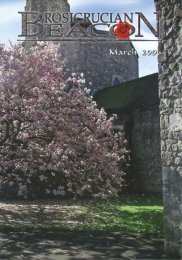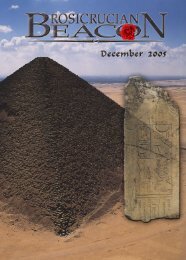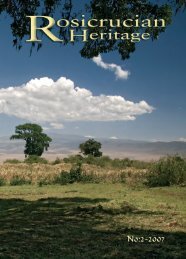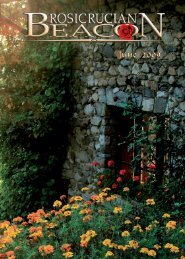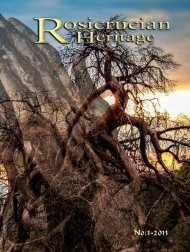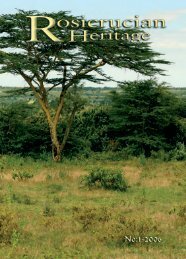Klaas-Jan BAKKER - AMORC
Klaas-Jan BAKKER - AMORC
Klaas-Jan BAKKER - AMORC
Create successful ePaper yourself
Turn your PDF publications into a flip-book with our unique Google optimized e-Paper software.
time to learn so much about grasses while being<br />
immersed in the duties of a general. He replied<br />
that he was only a general in his spare time.<br />
In the visitors’ book you read of gratitude for<br />
being inspired by the life of simplicity led by such<br />
a famous man. Smuts abhorred any ostentation.<br />
He only accepted a Field Marshall’s baton when it<br />
He was inspired by the life of simplicity,<br />
abhorring any ostentation.<br />
was presented to him by King George VI during<br />
the royal visit to South Africa in 1947. In 1931 he<br />
became the first foreign President of the British<br />
Association for the Advancement of Science and<br />
in 1948 he was elected Chancellor of Cambridge<br />
University, becoming the first foreigner to hold<br />
that position. He remained Chancellor until his<br />
death.<br />
The Whitman Connection<br />
While a student at Cambridge in the 1890’s<br />
he befriended a number of Quakers. After the<br />
Anglo-Boer War, Emily Hobbhouse introduced<br />
him to another Quaker, Mary Clark, later Gillett.<br />
From 1919 until his death in 1950 he kept an<br />
almost weekly correspondence with her and it<br />
is in these letters that we discover the mystical<br />
In 1926 Smuts wrote Holism and Evolution in which he extended<br />
the Darwinian concept of organic evolution to the development of<br />
greater organised entities, including that of human activities.<br />
When living on his farm, Doornkloof near Pretoria, he would, before<br />
sunrise every morning, climb up the hill on his farm to commune<br />
with the divine. When in Cape Town, he would regularly ascend<br />
Table Mountain on foot for that same private communion.<br />
Smuts. As a student he wrote Human Whitman:<br />
A study in the evolution of human personality,<br />
which was only published in 1972. He wrote to<br />
Mary Clark about the influence of Whitman:<br />
“Whitman did a great service to me in making me<br />
appreciate the Natural man and freeing me from<br />
much theological or conventional preconceptions<br />
due to my early pious upbringing. It was a sort of<br />
liberation, as St Paul was liberated from the Law<br />
and its damnations by his Damascus vision.<br />
“Sin ceased to dominate my view of life, and this<br />
was a great release as I was inclined to be severely<br />
puritanical in all things. A great release and a<br />
useful service.”<br />
During the Anglo-Boer War he kept a copy of<br />
Whitman’s Leaves of Grass with him, given to him<br />
by his future wife, Issy Krige. The other books<br />
in his saddlebag were Kant’s Kritik der reinen<br />
Vernunft, the New Testament in Greek, Encomium<br />
Moriae of Desiderius Erasmus and Anabasis Kyron<br />
by Xenophon. Indeed unusual reading matter for<br />
a general fighting a guerrilla war. By coincidence,<br />
Xenophon’s description of the flight of the Greeks<br />
before the pursuing Persians mirrors Smuts’s<br />
epic trek with his commandos across the Cape<br />
Colony.<br />
In Richard M. Bucke’s book, Cosmic<br />
Consciousness, we learn about an enlightenment<br />
experienced by Whitman. The poems of Whitman,<br />
<br />
The Rosicrucian Beacon -- December 2007



